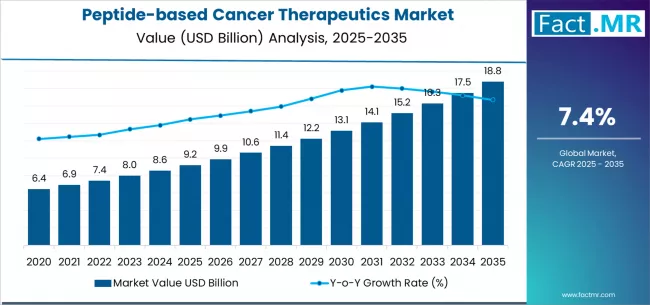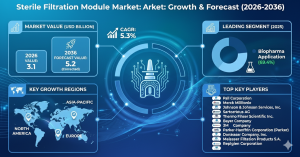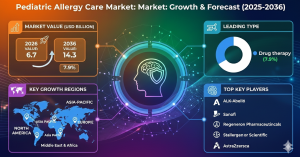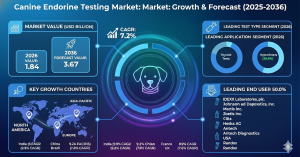The global peptide-based cancer therapeutics market is poised for remarkable expansion, reflecting the biopharmaceutical industry’s deepening focus on precision oncology. According to a new report by Fact.MR, the market is valued at USD 9.2 billion in 2025 and is projected to reach USD 18.7 billion by 2035, registering a compound annual growth rate (CAGR) of 7.4% during the forecast period. This represents a 103.3% total growth, highlighting a significant transformation in cancer treatment paradigms.
Strategic Market Drivers
Rising Demand for Targeted and Personalized Cancer Therapies
The increasing incidence of cancer worldwide, coupled with the limitations of conventional chemotherapies, is driving the adoption of peptide-based therapeutics. These drugs offer enhanced tumor selectivity, reduced toxicity, and improved patient outcomes, aligning with the growing trend toward personalized medicine.
Technological Advancements in Peptide Design and Synthesis
Rapid progress in solid-phase peptide synthesis (SPPS), drug delivery systems, and bio-conjugation technologies has enabled the development of more stable and bioavailable peptide drugs. Enhanced formulations are now overcoming traditional barriers such as enzymatic degradation and short half-life, widening their clinical potential.
Expanding Oncology Pipeline and Clinical Approvals
Global biopharma companies are accelerating R&D in peptide-based drugs targeting solid tumors and hematological malignancies. Growing success rates in clinical trials and favorable regulatory pathways are reinforcing investor confidence in this therapeutic class.
Rising Healthcare Investments and Precision Medicine Initiatives
Governments and private entities are increasingly investing in cancer genomics, peptide synthesis platforms, and immuno-oncology research, creating a fertile ecosystem for innovation and commercialization.
Browse Full Report: https://www.factmr.com/report/179/peptide-based-cancer-therapeutics-market
Regional Growth Highlights
North America: Leading in Innovation and Clinical Development
The United States dominates global market share, backed by robust R&D infrastructure, strong oncology pipelines, and early adoption of targeted therapies. Key pharmaceutical players and academic collaborations are driving peptide-based cancer drug development across multiple indications, including breast, prostate, and lung cancers.
Europe: Regulation and Research Excellence Fuel Market Growth
Europe’s growth is underpinned by advanced clinical research frameworks and stringent regulatory support for precision medicine. Countries like Germany, the U.K., and Switzerland are spearheading peptide innovation through government-backed cancer research programs and partnerships between biotech startups and established pharma leaders.
Asia-Pacific: Rapid Expansion through Healthcare Modernization
East Asia and South Asia are emerging as high-growth regions, driven by increasing cancer prevalence, rising healthcare spending, and expanding access to innovative treatments. China and Japan, in particular, are advancing peptide-based R&D through domestic biotech investments and international licensing collaborations.
Emerging Markets: Building Capacity and Access
Latin America and the Middle East are gradually adopting peptide-based oncology solutions through clinical partnerships and public health initiatives aimed at improving cancer treatment infrastructure and access to biologics.
Market Segmentation Insights
By Type:
- Cytotoxic Peptides – Used in targeted destruction of cancer cells with minimized systemic toxicity.
- Hormonal Peptides – Gaining traction in treating hormone-sensitive cancers such as breast and prostate.
- Immunomodulatory Peptides – Central to the development of peptide-based vaccines and immune checkpoint therapies.
- Cell-penetrating Peptides – Pioneering novel drug delivery mechanisms for intracellular targets.
By Application:
- Breast Cancer
- Lung Cancer
- Prostate Cancer
- Melanoma
- Other Solid Tumors and Hematologic Malignancies
By Route of Administration:
- Parenteral – Dominant due to high bioavailability and targeted delivery advantages.
- Oral and Transdermal – Emerging delivery modes enabled by advancements in formulation technology.
Challenges and Market Considerations
- Manufacturing Complexity: Peptide synthesis and purification remain cost-intensive, requiring high precision and advanced technology.
- Short Biological Half-life: Despite improvements, maintaining peptide stability in vivo continues to pose challenges.
- Stringent Regulatory Pathways: Compliance with evolving FDA and EMA oncology guidelines increases development timelines.
- Market Competition: Novel biologics, monoclonal antibodies, and gene therapies represent competitive therapeutic alternatives.
Competitive Landscape
The global peptide-based cancer therapeutics market is characterized by strong innovation, clinical collaboration, and portfolio diversification. Leading companies are investing in combination therapies, synthetic peptide analogs, and next-generation delivery platforms.
Key Players in the Peptide-based Cancer Therapeutics Market:
- Novartis AG
- Ipsen SA
- AbbVie Inc.
- Amgen Inc.
- AstraZeneca PLC
- Bristol Myers Squibb Company (BMS)
- Takeda Pharmaceutical Company Limited
- Merck & Co. Inc.
- Roche Holding AG
- Eli Lilly and Company
Recent Developments
- 2024 – Novartis AG announced the expansion of its peptide oncology portfolio through AI-driven discovery partnerships aimed at accelerating peptide drug design.
- 2023 – Amgen Inc. initiated Phase III trials of a novel peptide therapeutic targeting KRAS-mutant cancers.
- 2023 – Roche Holding AG launched a strategic collaboration with biotech startups for peptide-based immunotherapy combinations.
- 2022 – Ipsen SA received regulatory approval for a long-acting peptide analog for neuroendocrine tumors in multiple global markets.
Future Outlook: Precision-driven, Sustainable Oncology Therapeutics
The next decade will mark a turning point in cancer therapeutics, as peptide-based drugs gain traction for their precision, efficacy, and safety profiles. Integration of AI-based peptide design, nanocarrier delivery systems, and multi-target oncology approaches will redefine drug development pipelines.
As cancer treatment shifts toward individualized medicine and combination regimens, the peptide-based cancer therapeutics market will continue its strong growth trajectory. Companies that invest in R&D agility, sustainable production, and strategic global partnerships will lead the transformation of oncology care—making cancer therapy more targeted, effective, and accessible worldwide.



